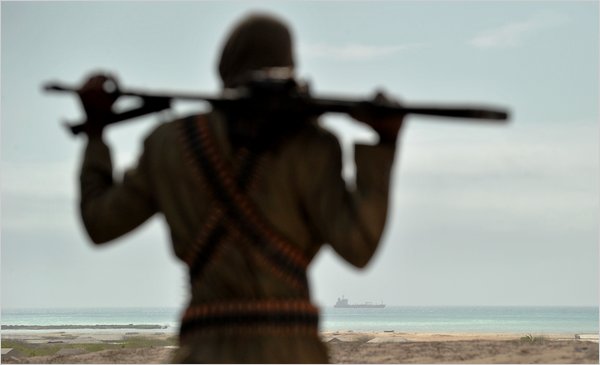At some point, Thomas Jefferson realized, you just can’t do business with pirates any more.
Suddenly, a Rise in Piracy’s Price

SHIPPING HAZARD On shore, a Somali pirate boss. In the distance, a hijacked ship.
By JEFFREY GETTLEMAN
Multimedia
Related
-
Seizing of Pirate Commanders Is Questioned (February 24, 2011)
-
Pirates Brutally End Yachting Dream (February 23, 2011)
-
Times Topic: Piracy at Sea
For years, the infant American government, along with many others, had accepted the humiliating practice of paying tribute — essentially mob-style protection fees — to a handful of rulers in the Barbary states so that American ships crossing the Mediterranean would not get hijacked. But in 1801, Tripoli’s pasha, Yusuf Karamanli, tried to jack up his prices. Jefferson said no. And when the strongman turned his pirates loose on American ships, Jefferson sent in the Navy to bombard Tripoli, starting a war that eventually brought the Barbary states to their knees. Rampant piracy went to sleep for nearly 200 years.
The question now is: Are we nearing another enough-is-enough moment with pirates?
On Tuesday, Somali pirates shot and killed four American hostages. A single hostage intentionally killed by these pirates had been almost unheard of; four dead was unprecedented. Until now, the first thing that came to mind about Somalia’s buccaneers was that they were brash and mercurial. Just a few weeks ago they let go some Sri Lankan fishermen after they essentially said, “You’re poor, like us.” They were seen as a nuisance, albeit an expensive one, but not a lethal threat.
Exactly what happened Tuesday is still murky. Pirates in the Arabian Sea had hijacked a sailboat skippered by a retired couple from California, and when the American Navy closed in, the pirates got twitchy. Navy Seals rushed aboard but it was too late. It’s still not clear why the pirates would want to kill the hostages when their business model, which has raked in more than $100 million in the past few years, is based on ransoming captives alive.
“Of course, I do not know what the U.S. will do in response to this latest atrocity,” said Frank Lambert, a professor at Purdue who is an expert on the Barbary pirates. But, he said, “Jefferson advocated an armed response and eventually war against Tripoli for far less provocation.”
For years now, Somali pirates with fiberglass skiffs and salt-rusted Kalashnikovs have been commandeering ships along one of the most congested shipping routes in the world — the Gulf of Aden, a vital conduit for Middle East oil to Europe and the United States. More than 50 vessels are now held captive, from Thai fishing trawlers to European supertankers, with more than 800 hostages. Those numbers grow each year.
But the international response has been limited, partly because the most promising remedies are intensely complicated and risky. Western powers, including the United States, have sent warships to cruise Somalia’s coast and discourage attacks. When a vessel is hijacked, ship owners cough up a ransom, nowadays in the neighborhood of $5 million, and most of that cost gets passed to the end user — consumers. Until recently, most hostages would emerge unharmed, albeit skinny and pale from being locked in a filthy room. The average time in captivity is around six months.
But recently the pirates have been getting more vicious; reports have emerged of beatings, of being hung upside down, even of being forced at gunpoint to join in raids. And now the pirates have gunned down four Americans.
“I think there’s going to be some type of retaliation,” said a European diplomat in Nairobi, Kenya, who trades ideas on anti-piracy strategies with other diplomats and was instructed not to speak publicly about the issues. “I could see the Americans going after the pirate bosses, the organizers, maybe even blockade some of the ports that they use,” he speculated. “I don’t think the Americans are going to invade Somalia, because of Iraq and Afghanistan, but they can use local allies.” Another obvious possibility would be American Special Forces, who have killed terrorism suspects in Somalia.
The American government isn’t revealing its plans but officials suggest — as long as they are not quoted by name — that the killings of the four Americans could be a game-changer. “We get it,” said one State Department official. “We get the need to recalibrate.”
Any course of action, however, will confront two huge obstacles: the immensity of the sea and the depth of chaos in Somalia.
The pirates used to stick relatively close to Somalia’s shores. But now, using “mother ships” — hijacked vessels that serve as floating bases — they attack ships more than 1,000 miles away. Sometimes that puts them closer to India than to home. The red zone now covers more than one million square miles of water, an area naval officers say is impossible to control.
Piracy Inc. is a sprawling operation on land, too. It offers work to tens of thousands of Somalis — middle-managers, translators, bookkeepers, mechanics, gunsmiths, guards, boat builders, women who sell tea to pirates, others who sell them goats. In one of the poorest lands on earth, piracy isn’t just a business; it’s a lifeline.
And this gets to the real problem.
“The root cause is state failure,” the American official said.
Somalia’s central government collapsed more than 20 years ago, and now its landscape includes droughts, warlords, fighters allied to Al Qaeda, and malnutrition, suffering and death on a scale unseen just about anywhere else.
The United States and other Western powers are pouring millions of dollars into Somalia’s transitional government, an appointed body with little legitimacy on the ground, in the hope, perhaps vain, that it can rebuild the world’s most failed state and create an economy based on something like fishing or livestock. Young men then might be able to earn a living doing something other than sticking up ships.
But the transitional government has been divided, feckless and corrupt. Islamist rebels control much of the country. Few Somalis think the nation will stop being a war zone any time soon.
The shipping industry seems to know this.
“Until things change on land, you have to come down very hard on them at sea,” said Cyrus Mody, manager of the International Maritime Bureau in London.
Shipping companies are frustrated, he said, because while many pirates are apprehended at sea by foreign navies, the vast majority are typically released unless they are caught in the act of a hijacking a ship — which is a very narrow window because once pirates control a vessel, it’s extremely dangerous to intervene.
“The laws have to be amended,” Mr. Mody said. “Why would a skiff be 800 miles off Somalia with a rocket-propelled grenade, a ladder and extra barrels of fuel? What are they doing? Fishing? These people need to be arrested and prosecuted.”
The last resort is military action. Many people ask: Why not storm ashore and attack the pirate bases? These dens are well known. I even visited one last year and met a pirate boss who was using millions of dollars in ransoms to build a land-based army that at first glance looked more disciplined and better equipped than Somalia’s national army.
But the military option would not be pretty. The 800 or so captured seamen could be used as human shields. And no Western country has shown an appetite to send troops to Somalia, not after the Black Hawk Down fiasco of 1993, when ragtag Somali militiamen downed two American helicopters and killed 18 elite American troops. And a military attack could easily backfire. “They might kill a few pirates, but more would certainly spring up to replace them,” said Bronwyn Bruton, who wrote a widely discussed essay on Somalia. “The replacements would probably be even angrier and more violent.” In her essay, she advised the international community to essentially pull out and let Somalis sort out their problems on their own.
She added that collateral damage from a raid could be severe and “a lot of civilian casualties could actually wind up aggravating a much bigger security threat to the U.S. — terrorism.”
So it seems that Jefferson may have had an easier piracy problem to solve.
“I can offer a couple thoughts based on the U.S.’s dealing with pirates more than 200 years ago,” Mr. Lambert said. “If the U.S. response is a vigorous military response, it is likely to be difficult, costly, and prolonged” — a reference to the war that followed bombardment of the coast.
But, he warned, “If it is a continuation of the present policy (whatever that is), it is almost a certainty that we will see more or perhaps escalated atrocities. ‘’
Copyright 2011 The New York Times Company. Reprinted from The New York Times, Week in Review, of Sunday, February 27, 2011.
